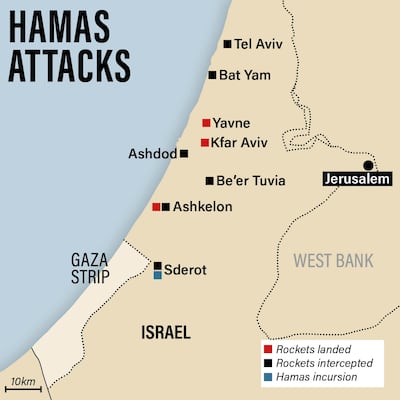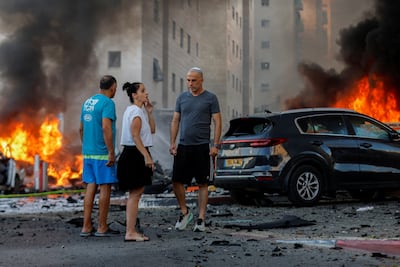Hamas has launched the biggest attack on Israel in years in a surprise assault that involved gunmen crossing the border from Gaza with a heavy barrage of rockets from the Palestinian enclave.
Militants in Gaza launched dozens of rockets towards Israel early on Saturday, as air raid sirens sounded across the country.
Warnings of incoming rockets were heard for several minutes in southern areas surrounding Gaza and in the greater Tel Aviv and Jerusalem areas.
Israel's ambulance service said at least 40 Israelis were killed and hundreds wounded in the Hamas attack but the total appeared likely to rise, making it the deadliest attack in Israel in years.
The Palestinian Health Ministry confirmed at least 198 were killed so far while 1,610 were wounded by Saturday afternoon in Gaza following Israeli retaliation on the Palestinian territory.
Following the rocket attacks, Israel declared a state of alert for war and sent aircraft to strike back.
Explosions could also be heard in cities around Tel Aviv and outside Jerusalem.
The rocket fire was launched from several locations in Gaza starting at 6.30am, AFP reported.
The Israeli army urged the public to stay close to bomb shelters.
Israeli soldiers 'captured'
Unverified videos circulating on social media from Gaza showed militants dragging the bodies of several Israeli soldiers into the streets in celebration.
The former head of Israel’s National Security Council, Maj Gen Giora Eiland, told The National that Israeli forces are likely to hold off on taking extraordinary measures to conduct a rescue mission to retrieve captured soldiers taken into Gaza.
“I don’t think that we will try to do something specifically today in regards to these people. I think this will happen in the second phase once we push back the Hamas fighters to Gaza.
“But one of the main goals will be to bring them back, hopefully alive. I don’t think we’ll stop the operation until we have them,” he said.
The Israeli military said it was hitting the Gaza Strip after Hamas, the militant group that controls of the enclave, announced another operation against Israel.
At least three explosions could be heard as Israel's anti-rocket defences went into operation.
Following a security cabinet meeting at the Israeli military headquarters in Tel Aviv, Defence Minister Yoav Gallant warned that Hamas “made a grave mistake” in launching barrages of rockets into southern and central Israel in its surprise morning attack.
In one of the most serious escalations in years between Israel and the militant group that rules Gaza, Hamas gunmen crossed the border fence at several places and infiltrated Israeli communities.
“The state of Israel will win this war,” Mr Gallant said.
The attack in Jerusalem is considered a major escalation by Israel.
More than 5,000 rockets were fired from the Gaza Strip into Israel, Hamas's armed wing said. It announced it had started “Operation Al Aqsa Flood”.

“We decided to put an end to all the crimes of the occupation (Israel), their time for rampaging without being held accountable is over,” the group said.
“We announce Operation Al Aqsa Flood and we fired, in the first strike of 20 minutes, more than 5,000 rockets.”
A senior Hamas official told The National that the operation on Saturday was a response “to the crimes of the occupation”.
“Our fighters today are carrying out a massive operation in our defence of our Al Aqsa Mosque in Jerusalem and the thousands of Palestinian prisoners held by Israel,” he said.
Ari, 29, told The National from Tel Aviv that residents of the city were awakened early on Saturday by the sirens and immediately sought shelter.
“Behind my building on the main road, people were running into the bomb shelter. I was the last one in. There were kids streaming in and I was throwing them down. Just before I got down, we heard a massive boom. I looked behind and there was smoke billowing out,” he said.
Speaking to The National from Gaza, Abdullah Hammoudeh, 31, said residents have begun taking shelter in anticipation of continued aerial bombardment from Israel.
“Things have been moving very, very fast for us this morning. We've started taking extra precautions right now by stocking up on food and our emergency necessities in case this escalates to the levels of the 2008 war and 2014. There's a lot of tension among us and we're afraid of the days to come,” he said.

Rising casualties
The Israeli rescue service Magen David Adom reported at least 16 casualties, including a woman in her 60s who was killed when a rocket fired from Gaza made a direct hit. Two others were in serious condition.
There were reports of many more casualties on both sides, but authorities did not immediately release details. Israeli media reported that dozens of people were hospitalised in southern Israel. The Palestinian Health Ministry in Gaza reported injuries among “many citizens” without giving numbers and loudspeakers on mosques broadcast prayers of mourning for killed militants.
The office of Israeli Prime Minister Benjamin Netanyahu said he would convene a meeting with security chiefs.
Israel has imposed a blockade on Gaza since 2007 after Hamas took power.
The latest escalation in violence comes after more than a week of tensions in Israel after soldiers shot and killed two Palestinians in the occupied West Bank on Thursday.
Abdul Rahman Atta, 23, and Huthaifa Faris, 27, were near killed near the village of Shufa.
An increase in Jewish worshippers entering Al Aqsa Mosque compound in Jerusalem over the holiday of Sukkot this past week has also contributed to a rise in tensions.
The mosque, the third holiest site in Islam, is the most sensitive site in the Palestinian-Israeli conflict.
The mosque fell under Jordanian authority after Israel was created in 1948. Israel captured the site in East Jerusalem in the 1967 war but allowed it to remain under Jordanian administration.
Chris Doyle, director of the Centre for Arab British Understanding, said the “long-term failure” on Gaza is likely to prolong the conflict.
“There is a long-term failure on Gaza and on the issue of Palestine: the assumption that you can leave that small strip of land to fester and it can stay contained. It won’t,” he told The National.
“The international community as a whole has to take stock of this. We have a long-term situation in Gaza which is completely unsustainable, two million under blockade with no horizon,” he said.




















































